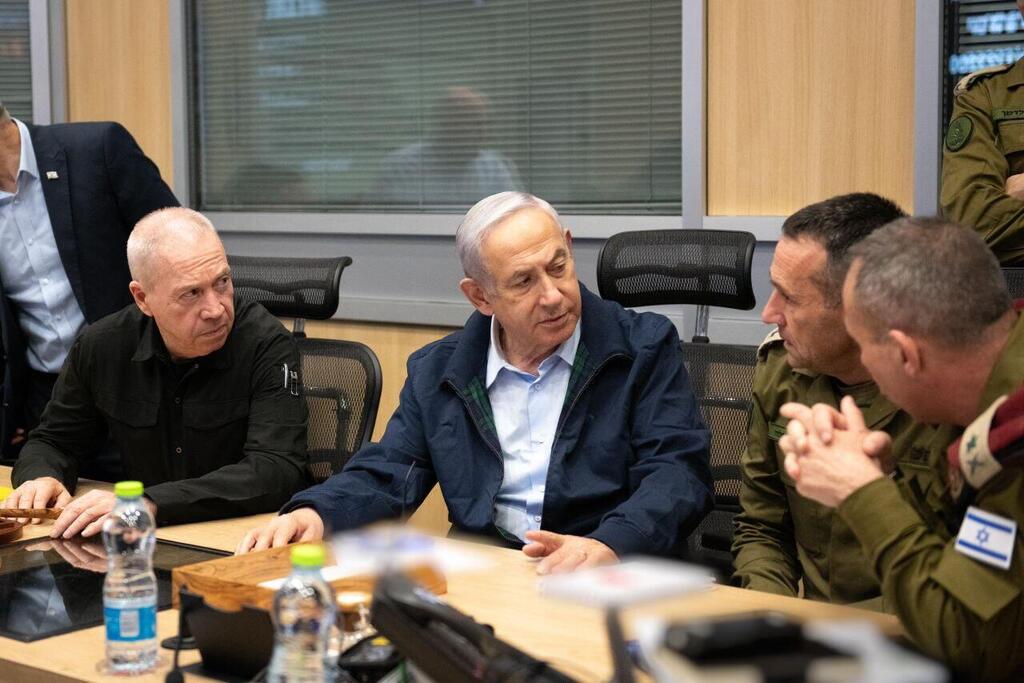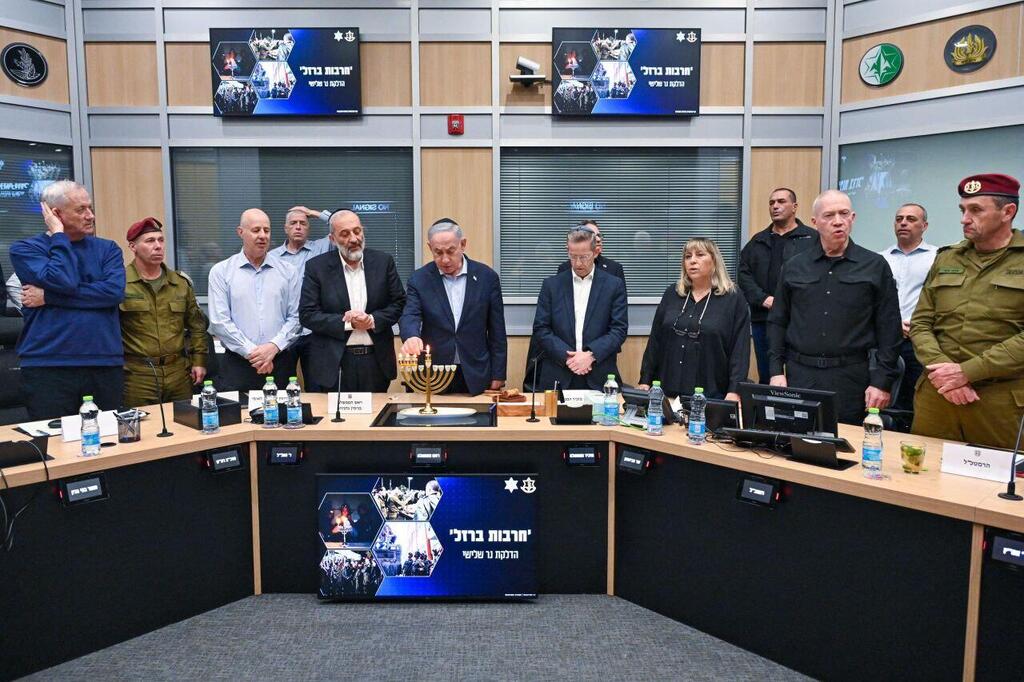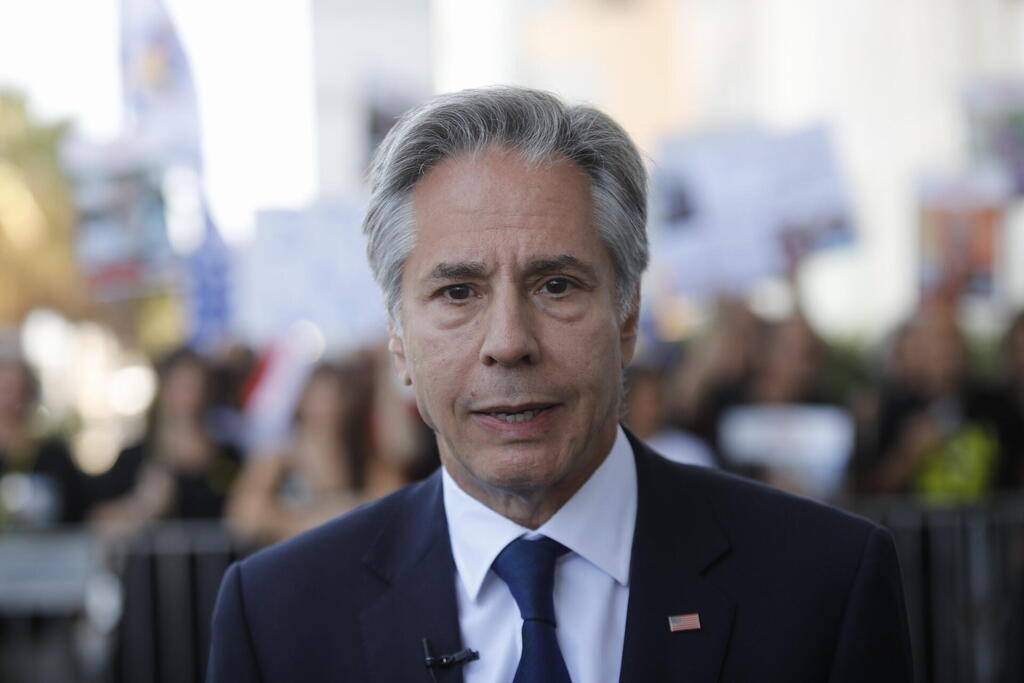Getting your Trinity Audio player ready...
Prime Minister Benjamin Netanyahu informed the Security Cabinet ministers on Sunday of the dissolution of the War Cabinet, a week after the National Unity Party exited the emergency government, leading to the departure of Benny Gantz and Gadi Eisenkot from the small forum.
Netanyahu's decision was expected amid National Security Minister Itamar Ben-Gvir's demand to join the forum in place of the departing ministers. Following their departure, the War Cabinet consisted only of Prime Minister Netanyahu, Defense Minister Yoav Gallant, Netanyahu's close ally Strategic Affairs Minister Ron Dermer and Shas leader Arye Deri.
Despite the announcement of the dissolution, it was anticipated even before Gantz's departure that the small forum known as the "War Cabinet" would be disbanded. Instead, Netanyahu is expected to continue convening small meetings under the guise of "consultations," excluding Ben-Gvir and Finance Minister and Minister in the Defense Ministry Bezalel Smotrich.
In practice, the War Cabinet—without Eisenkot and Gantz—has already convened via a phone call, though the Prime Minister's Office described the meeting as a "security consultation," even though the participants were the same as those in the War Cabinet, including National Security Advisor Tzachi Hanegbi and other invitees. At least two such meetings have been held, one of them last Thursday, addressing the escalation on the northern front and hostage negotiations.
Efficiency versus coalition pressures
Netanyahu's decision was influenced by significant pressure. On one hand, the War Cabinet was the most effective body for managing the war since its outbreak. It was part of the agreement between Netanyahu and Gantz, stipulating that the tactical management of the war would take place in this forum rather than the larger cabinet.
Unlike the expanded cabinet, which sometimes includes around 50 people, including ministers, additional security officials, advisors and chiefs of staff, managing the meetings in the smaller War Cabinet was easier due to the fewer participants. All members spoke the same language, and while the meetings might last for hours, they were not as exhausting as those of the expanded cabinet, where every minister seeks to speak.
The War Cabinet convened dozens of times throughout its existence, but rarely did participants reach the point of voting. Only Netanyahu, Gantz and Gallant had voting rights, but most decisions were made by consensus, rendering votes unnecessary.
Before dissolving the small forum, Netanyahu felt at odds with his colleagues regarding the hostages and sought to transfer decisions about the negotiating team's mandate to the expanded cabinet which includes ministers with more hawkish views, who oppose softening positions. Netanyahu believed the mandate for the negotiating team should be approved by the expanded cabinet.
After Gantz's departure, U.S. officials, including Secretary of State Antony Blinken, urged Netanyahu not to dissolve the War Cabinet. Washington views it as a more moderate body less likely to make extreme decisions. One option was for Foreign Minister Israel Katz to join, but Smotrich and Ben-Gvir insisted that if the cabinet were to be expanded, they must be included. Netanyahu understood that acting otherwise would create conflict with coalition partners and ultimately decided to maintain the forum, but not under its previous name.
By dissolving the War Cabinet, Netanyahu potentially restricts his own freedom of action, but this may be intentional. Important decisions will now have to go through the expanded cabinet, which has a majority of hawkish ministers and little room for maneuvering. This might align with his efforts to prevent ending the war.
Next steps against the Palestinian Authority
Last week, following Gantz's resignation, National Security Minister Itamar Ben-Gvir sent a letter to Prime Minister Netanyahu demanding to join the War Cabinet. "Now, with the departure of the ministers of the previous conception, there is no excuse to exclude senior partners and ministers who warned in real-time about the flawed approach that is now recognized as wrong. As a minister in the government, party leader and senior coalition partner, I demand to join this cabinet." He signed the letter, apparently by mistake, as "MK Itamar Ben-Gvir, Minister of Security."
The Prime Minister's Office said that the Security Cabinet meeting discussed several measures to "strengthen settlements in Judea and Samaria" at Sunday night's meeting. These measures are a response to countries that unilaterally recognized a Palestinian state after October 7 and to the Palestinian Authority's actions against Israel in international bodies.
Defense Minister Yoav Gallant and Attorney General Gali Baharav-Miara requested additional time to comment on some proposals. Netanyahu instructed that all proposals be brought to a vote at the next cabinet meeting.






